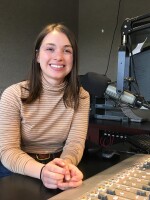Utah Gov. Gary Herbert, Lt. Gov. Spencer Cox and other key stakeholders met Monday to update media on the state’s response to COVID-19, known as coronavirus. Herbert says the risk is currently low in Utah, but the state has activated its emergency operations center.
“We’re hoping for the very best outcome with minimal impact on our communities, but we're preparing for the worst, just in case,” Herbert said.
Cox heads up the Utah COVID-19 Community Task Force, which includes representatives from the state Department of Health; Utah’s business and education communities; and both the Intermountain Health Care and University of Utah Health Care systems.
Cox says it’s the task force’s responsibility to inform the public and make recommendations to the legislature, local health departments and community organizations in their response to COVID-19.
“The one takeaway that we would give right now is every organization, every business, every church, every family needs to talk about their own plan,” Cox said.
State Epidemiologist Dr. Angela Dunn says the Utah Dept. of Health is focused on identifying anyone in Utah who possibly has the virus. The state is monitoring 65 people who have traveled from China — those people are quarantined in their homes, and their local health departments are checking in with them daily. The state has also tested 17 Utahns for coronavirus. Fifteen tests have come back negative, and two results are still pending. Dunn says the state has capacity to test up to 400 people. If someone believes they have the virus, they need to contact their health care provider before heading in for care, so physicians can prepare and contact the Dept. of Health.
Although most cases are mild, with flu-like symptoms, COVID-19 can disproportionately impact vulnerable populations, such as the elderly and those with underlying conditions, like respiratory disease or immune system deficiencies. Dunn says the state is targeting outreach to those populations as well as to people experiencing homelessness and those who don’t speak English.
“We can definitely expect community spread of COVID-19 in Utah," Dunn said. "That is happening in other states surrounding us, and that's what we are preparing for.”
Dunn says the reason health departments are taking COVID-19 more seriously than the annual flu is there’s a lot that’s still unknown about the disease. There’s no vaccine or treatment currently available, so health care providers recommend washing your hands frequently, staying home if you feel sick and covering your mouth with a tissue or sleeve when you cough. If the situation becomes more serious, Dunn says social distancing might be key.
“Potentially school closures, not going to church on the weekends — those sorts of mass gathering limitations could become an essential part of our public health response,” Dunn said.
Herbert says Utah’s culture of preparedness and volunteerism will help the state respond to the virus—that and some extra funding in the state budget.
“The fact that we have a very fiscally prudent legislature allows us to have reserves and money and resources available that many states will not have," Herbert said. "Should have but don't have.”
The Summit County Board of Health also met Monday to discuss the local response to the virus. For more information, visit coronavirus.utah.gov.



